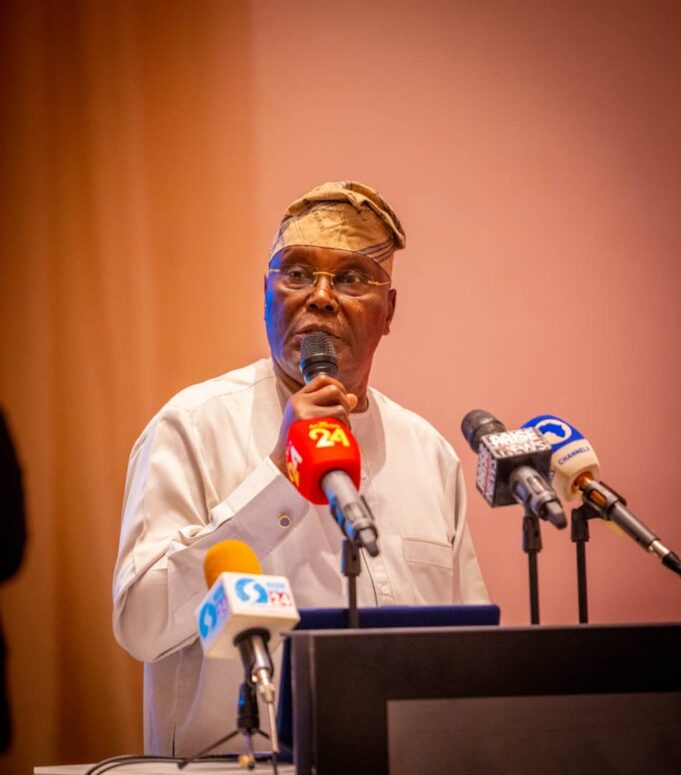The presidential candidate of the Peoples Democratic Party (PDP), Atiku Abubakar, has accused the ruling All Progressives Congress (APC) of failing to fulfil its promises to Nigerians during their campaigns in 2015, especially the promise to restructure the country once voted into power.
Atiku said there was a difference between the PDP-led government from 1999 to 2015 and the regime of President Muhammadu Buhari under the platform of the APC from 2015 to date.
The former Vice President said this while speaking during a meeting with the leadership of the Christian Association of Nigeria (CAN) in Abuja on Tuesday.
The PDP presidential flag-bearer, who stressed the need for a constitutional amendment which he promised to work on if elected as president in 2023, said he would decentralise the Nigerian Police Force (NPF) to states and communities.
He said: “There is a difference between the government that ran this country from 1999 to 2015 and the government that has been running this country from 2015 till date.
“One example I want to give you, they said they believe in restructuring but did they restructure? So they told Nigerians what they wanted to hear and did a different thing when they got the opportunity and came on board. In PDP we don’t behave like that.
“The fundamental front lines that we have seen in the last 7 to 8 years only occurred because you wanted to change in 2015, and you elected the change you are seeing and experiencing now.”
Atiku added that CAN’s charter of demands holds the same content with his book which he authored in 2015 which he said has continued to believe in and stand by despite the disagreement between him and his then principal, former President Olusegun Obasanjo, and his constituency in Adamawa State.
READ ALSO: Buhari excited, inaugurates 1bn barrel oil reserves in Bauchi/Gombe
“I stand before you here not to campaign but to tell you the honest truth, what you have presented to us is what I have always believed in, and if I have the opportunity, I swear to God, I will do it.
“Not only did my President and I have problems, but I also had problems with my own constituency where I come from, but because it is something that I believed in, I still stand by those objectives in that book,” the former Vice President said.
Speaking on the decentralisation of the NPF, Atiku said: “We cannot have state police without having a constitutional amendment, so we will go into constitution amendment where we will have different levels of police. These are our plans to tackle the security challenges facing the country.
“For sure we need a judicial amendment; first of all, there are poor wages for Judges and very poor working conditions. Again, the judiciary has levels, the federal judiciary, and state, but we will attempt as much as possible to have a judicial reform where we will improve the dispensation of justice and also the welfare of judges.
“I am a supporter of the removal of clause of the definition of indigenship in our constitution, once you reside in any part of the country, and you pay your taxes, you should be entitled to indigenship.”
Also speaking at the meeting, the PDP’s vice-presidential candidate and Delta State Governor, Ifeanyi Okowa, said Nigeria was in dire need of a leader who was humble and patient enough to listen to the demands and yearnings of the people he wants to govern.
“There is disunity, we have never been as divided as we are and at this moment we need a man of humility and patience to sit with all the different classes of Nigerians to listen to them and think along with them and that man must have the needed experience to guide and lease the nation,” Okowa stated.
On his part, the CAN President, Daniel Okoh, blamed the challenges bewildering Nigeria on what he described as the “incoherent constitutional and institutional framework” of the country.
Okoh stressed that CAN had spent time reviewing the problems that hindered peace and progress in the country and articulated suggestions on how best to resolve them.
“We have consulted with Nigerians of diverse religious, ethnic, and social identities on the problems of the country and the solutions to them have been articulated in the strategic document we call the Charter for Future Nigeria
“The document considers this incoherence in political, social, and economic dimensions. It makes genuine recommendations for resolving Nigeria’s recurrent crises that border on justice and fairness, equality of all ethnic and religious groups, equal access to basic economic and social rights, political freedom, and an egalitarian and just social order,” he noted.
Okoh added that the essence of the dialogue was to ensure that all the presidential candidates understand the concerns of Nigerian Christians and propose policies and programmes to address them.
- JAMB: 2024 UTME results not available in paper format, website - May 2, 2024
- Police arrest 3 fake EFCC operatives robbing students in Nasarawa - May 2, 2024
- Transcorp revenue hits N88.6bn in Q1 2024 - May 2, 2024










